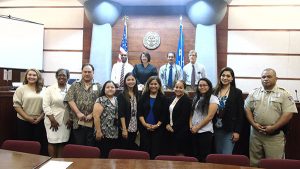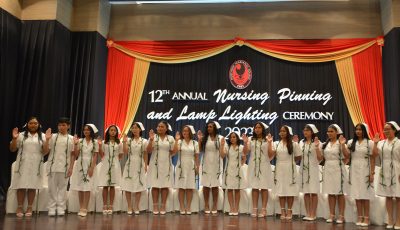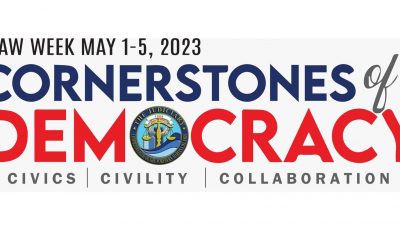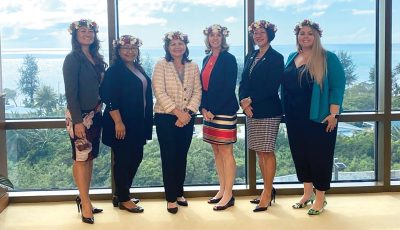2 are first graduates of CNMI Drug Court Program
1 participant is now a Customs officer

Superior Court Associate Judge Teresa K. Kim-Tenorio poses for a group photo with, to her left, Jesse Aguon Villagomez, who is among the first two graduates of the CNMI Drug Court Program, and members of the Drug Court at Thursday’s graduation ceremony in Superior Court. Also joining them is National Drug Court Institute Division Director Vanessa Price, front row, second from left. (Ferdie de la Torre)
Two persons, including one who is now a Customs officer, have been sober and have met all conditions without any violation since they joined the CNMI Drug Court Program in December 2016, making them the first graduates of the treatment program.
Associate Judge Teresa K. Kim-Tenorio, who has been presiding over the Drug Court sessions, granted the government’s motion to drop the illegal possession of controlled substance charges filed against Jesse Aguon Villagomez and the Customs officer, who was not named.
Kim-Tenorio recalled that when they started the program they were not sure about the kind of participants they would get, what the journey would be like, and when the participants would graduate.
Kim-Tenorio was also not sure what the conditions of the participants would be when they graduate.
“But here we are. Wow…I’m so proud of them. In a matter of a year and just a couple of months, they got jobs, they’re self-sufficient. One is a law enforcer, the other guy is gainfully employed,” the judge said.
She said the other graduate regained custody of his four children and his employer pays him well and trusts him.
“They are doing so well. This is why our treatment courts work,” Kim-Tenorio said, adding that she believes in not just having a drug court but also other treatment courts such as for driving while under the influence and others.
Treatment courts make an impact, she said, by giving participants a second chance, preparing them instead of just saying “here you go, good luck!”
“I’m very happy and I look forward to continue tracking their progress beyond drug courts to see how they do. But I have no doubt these two graduates will do very well,” she added.
In his keynote address, Superior Court Presiding Judge Robert C. Naraja said it took some time to make the Drug Court happen and the Judiciary and the Commonwealth get to finally realize the fruits of its labors. Naraja said the process of instituting the Drug Court started over 10 years ago.
“Now, after years of diligent work by members of all three branches of government, we have our first graduates from the program,” he said.
Naraja said that drug addiction has long been a problem in the Commonwealth. Now, he said, the Commonwealth is equipped with the treatment and justice tools needed to make a significant dent on this plague.
“These tools allow us to not only treat the individual, but to rebuild the familial bonds that are ravaged by this terrible problem,” the judge said.
Drug Court coordinator TaAnn T. Kabua said the two graduates are part of the eight original participants of the program. Of the eight, only one was terminated from the program, she said.
Kabua said the program will have new graduates again this July or August.
Including five who were accepted to the program last Thursday, the program now has a total of 41 participants. She said they also have a waiting list of 12 persons.
“The program is up to 24 months. But depending on your progress, with Jesse and the other graduate, they graduated early,” she said.
Kabua said the two graduates did not have any positive test for illegal drugs and only had very minor program violations like late calling.
“We promote the safety of the public so when we do curfew check, they call in, either they’re in compliance or they’re way above compliance,” she said. “It really shows to everyone that our participants are doing well with the support of our treatment providers, the case workers, and everybody in the drug court team.”
Kabua added that the participants’ interaction with Kim-Tenorio is not traditional as they are able to converse freely in court. She said the judge listens at a minimum of three minutes per participants when they come in front of her.
The Drug Court held its first session on Dec. 22, 2016.
Drug Court caseworker Jaclyn T. Mendiola and Marianas Behavioral Health International Inc. counselor Grace S. Vaiagae spoke about the accomplishments of the two participants and the phases of the treatment program.
National Drug Court Institute division director Vanessa Price made a special presentation by giving a symbolic gavel as a gift for Kim-Tenorio in recognition of the program’s success.
Police Officer III Frederick Sato made a case summary, such as how the two graduates were arrested, how they started the program, and how they’re determined to complete the program, among other things.
Chief Justice Alexandro C. Castro, Naraja, and Kim-Tenorio presented certificates of completion to the two graduates.
Gov. Ralph DLG. Torres, some lawmakers and Cabinet members, along with judges and justices and community leaders, attended the ceremony.
The U.S. District Court for the NMI has a separate drug court program called the Drug Offender Re-entry Program. Of the six DORE participants, three of them have already been terminated for continued drug use and other violations. Two have graduated from the program so far.



























